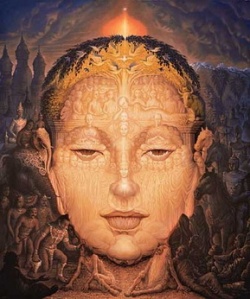Difference between revisions of "Three types of Buddha"
(Created page with "thumb|250px| Three types of Buddha There are traditionally three types of Buddha, the most important of which is the Samma Sammbuddha (Skt, Samyaksam Buddha...") |
|||
| Line 1: | Line 1: | ||
[[File:Bud 0.jpg|thumb|250px|]] | [[File:Bud 0.jpg|thumb|250px|]] | ||
| − | Three types of Buddha | + | Three types of [[Buddha]] |
| − | There are traditionally three types of Buddha, the most important of which is the Samma Sammbuddha (Skt, Samyaksam Buddha) or Universal Buddha. A Universal Buddha rediscovers the Dharma (the Truth regarding Existence) on his own and teaches others the Dharma. In our own age this Universal Buddha is represented by Siddhattha Gotama (Skt, Siddhartha Gautama). He is considered a great Buddha because he was an exceptional teacher of the Dharma, and his sermons are recorded as ''suttas'' or ''sutras'', which provide the basis of Buddhism as a religion. Of the other two types of Buddha, a ''Savaka Buddha'' (Skt, Sravaka Buddha) is a person who has become enlightened through acquaintance with the teaching of a Universal Buddha. A ''Pacceka Buddha'' (Skt, Pratekya Buddha) is someone who has become enlightened purely through his or her own wisdom (without the instruction of a Universal Buddha) but who has no cannot or chooses not to teach the Dharma to others. In Theravada Buddhism a Buddha is also called an arhat though in Mahayana Buddhism this term may only refer to Savaka Buddhas. |A Tang Dynasty sculpture of Amitabha Buddha, found in the Hidden Stream Temple Cave, Longmen Grottoes, China indicates. | + | There are [[traditionally]] three types of [[Buddha]], the most important of which is the [[Samma]] Sammbuddha (Skt, Samyaksam [[Buddha]]) or [[Universal]] [[Buddha]]. A [[Universal]] [[Buddha]] rediscovers [[the Dharma]] (the [[Truth]] regarding [[Existence]]) on his own and teaches others [[the Dharma]]. In our own age this [[Universal]] [[Buddha]] is represented by [[Siddhattha]] [[Gotama]] (Skt, [[Siddhartha Gautama]]). He is considered a great [[Buddha]] because he was an [[exceptional]] [[teacher]] of [[the Dharma]], and his sermons are recorded as ''[[suttas]]'' or ''[[sutras]]'', which provide the basis of [[Buddhism]] as a [[religion]]. Of the other two types of [[Buddha]], a ''[[Savaka]] [[Buddha]]'' (Skt, [[Sravaka]] [[Buddha]]) is a [[person]] who has become [[enlightened]] through acquaintance with the [[teaching]] of a [[Universal]] [[Buddha]]. A ''[[Pacceka Buddha]]'' (Skt, Pratekya [[Buddha]]) is someone who has become [[enlightened]] purely through his or her own [[wisdom]] (without the instruction of a [[Universal]] [[Buddha]]) but who has no cannot or chooses not to teach [[the Dharma]] to others. In [[Theravada Buddhism]] a [[Buddha]] is also called an [[arhat]] though in [[Mahayana Buddhism]] this term may only refer to [[Savaka]] [[Buddhas]]. |A {{Wiki|Tang Dynasty}} sculpture of [[Amitabha Buddha]], found in the [[Hidden]] Stream [[Temple]] [[Cave]], [[Longmen Grottoes]], [[China]] indicates. |
{{R}} | {{R}} | ||
[http://www.mauspfeil.net/suche.html?key=buddha www.mauspfeil.net] | [http://www.mauspfeil.net/suche.html?key=buddha www.mauspfeil.net] | ||
[[Category:Buddhist Terms]] | [[Category:Buddhist Terms]] | ||
[[Category:Buddhas]] | [[Category:Buddhas]] | ||
Revision as of 17:41, 3 September 2013
Three types of Buddha There are traditionally three types of Buddha, the most important of which is the Samma Sammbuddha (Skt, Samyaksam Buddha) or Universal Buddha. A Universal Buddha rediscovers the Dharma (the Truth regarding Existence) on his own and teaches others the Dharma. In our own age this Universal Buddha is represented by Siddhattha Gotama (Skt, Siddhartha Gautama). He is considered a great Buddha because he was an exceptional teacher of the Dharma, and his sermons are recorded as suttas or sutras, which provide the basis of Buddhism as a religion. Of the other two types of Buddha, a Savaka Buddha (Skt, Sravaka Buddha) is a person who has become enlightened through acquaintance with the teaching of a Universal Buddha. A Pacceka Buddha (Skt, Pratekya Buddha) is someone who has become enlightened purely through his or her own wisdom (without the instruction of a Universal Buddha) but who has no cannot or chooses not to teach the Dharma to others. In Theravada Buddhism a Buddha is also called an arhat though in Mahayana Buddhism this term may only refer to Savaka Buddhas. |A Tang Dynasty sculpture of Amitabha Buddha, found in the Hidden Stream Temple Cave, Longmen Grottoes, China indicates.
